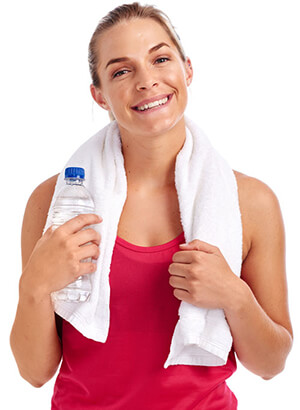
Sweating helps to regulate body temperature. The amount of sweat increases when it is warm outside, you eat really spicy food, you are physically active or stressed out and worried etc. Sweating helps cooling down the body. In addition, sweaty palms and soles contribute to enhanced grip.
Sweat is produced in millions of sweat glands across the body. The sweat glands are situated deep in the dermis layer of the skin or in hypodermis and consists of a base rolled into a ball and a duct carrying the sweat to the skin surface.
There are different kinds of sweat glands. Sweat from eccrine sweat glands consists almost solely of water, with some salts and minerals. Eccrine sweat glands are spread across the body and are mainly controlled by the internal “thermostat”, a small part of the brain called hypothalamus. They are primarily activated by heat and physical activity. The sweat glands in palms and soles on the other hand, are mainly controlled by the so called sympathetic nervous system, also called “fight and flight”.
The apocrine sweat glands are mostly located in the armpits and groin region. These glands are also activated by feelings like stress and anxiety. Apocrine sweat is more oily and holds more energy, containing salts as well as fat and protein.
An adult usually loses between 1 deciliter and 8 liters of water each day by sweating, so the individual variation is significant. Most common is probably between 2 and 5 deciliters at normal temperature and activity level. Sweat is almost odorless, but when it is consumed by small organisms (microbes) on our skin degradation products are created, causing the undesirable smell of sweat. The apoecrine sweat, with more energy for the microbes, results in more degradation products and more odor.
